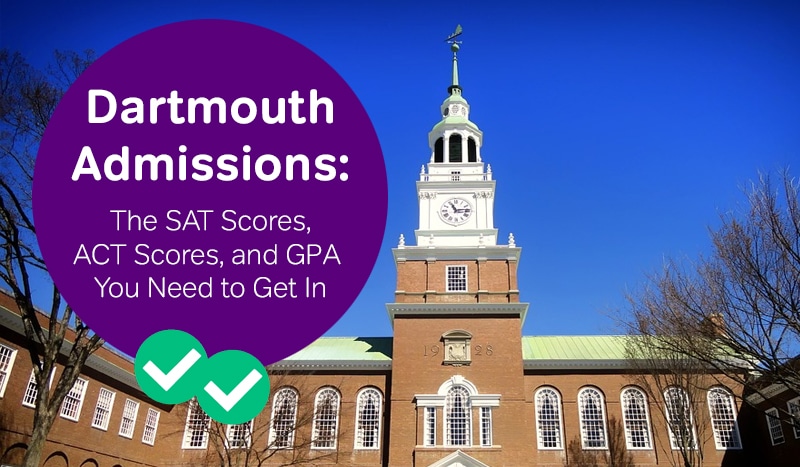How to Get Into Dartmouth
Today we’re talking about how to get into Dartmouth College–so let’s get the mandatory New Hampshire weather joke out of the way…

…well if that snow doesn’t deter your, then you must be pretty serious about going to Dartmouth–and we’re serious about getting you there!
In this post, we’ll take a look all things “Dartmouth Admissions,” including heaps of information on Dartmouth SAT and ACT scores and a really detailed profile of Dartmouth’s newest incoming freshman class.
Then, once we get through the data, we’ll take a look at what your best path to admission will look like!
Applying to Dartmouth?
It’s not surprising that you’re interested in Dartmouth. The school is extremely prestigious, and it’s been around for a long time.
The college was founded by Eleazar Wheelock (what a name!) in 1769, making it the ninth-oldest institution of higher education in the United States. A private research university, and member of the Ivy League, Dartmouth is located in Hanover, New Hampshire.
But Dartmouth is a lot more than a fancy pedigree:
- Dartmouth’s curriculum spans 40 academic departments and interdisciplinary programs, including 57 majors in the humanities, social sciences, natural sciences, and engineering–with the option for undergrads to design specialized concentrations or pursue dual degrees!
- If you’re an athletic type, you may be interested in joining one of Dartmouth’s 34 varsity sports teams, which compete in the Ivy League conference of the NCAA Division I.
- Dartmouth is consistently one of the highest-ranked universities in the US. A recent New York Times corporate study listed Dartmouth alumni as some of the most sought-after graduates in the world!!
- Dartmouth promises to cover 100% of students’ demonstrated financial need. Last year, Dartmouth distributed $95 million in scholarships to its students!
Attending Dartmouth means that you will be given the opportunity to contribute to new knowledge through research. For most students in most cases, that sort of thing doesn’t happen until they are working on their Master’s degrees.
Dartmouth even carries the idea of self-motivation into their scheduling, of all things! The terms are flexible and year-round. You decide how quickly or slowly you want to go through your program. For more information on that, look here.
Okay, okay, you probably don’t need us to convince you why you want to go to Dartmouth. We know what you came here for–let’s talk numbers!
Dartmouth SAT Scores
This year Dartmouth had more than 22,000 applications–and only 1,925 made the cut. It’s definitely not an easy school to get into, so it’s going to be important for you to have extremely competitive test scores if you want to stand out from the crowd.
Let’s take a look at the where Dartmouth’s most recently admitted students scored on the SAT:
| 25th Percentile | 50th Percentile | 75th Percentile | |
|---|---|---|---|
| Evidenced Based Reading & Writing | 700 | 750 | 770 |
| Math | 720 | 750 | 790 |
That’s a lot of pretty impressive numbers…but what score should you aim for?
Well, the advice we give all our students is to aim for the 75th percentile of whatever school you’re applying to–so, in this case, you’d want to set a Dartmouth SAT score goal of 770 for Evidence-Based Reading & Writing and 790 for Math.. If you need some inspiration, take a look at some of these real-life stories of how to get the perfect SAT score–and then get studying!
Dartmouth ACT Scores
While the SAT has been around for a lot longer, the ACT provides a good alternative for many students. If you’ve taken our SAT or ACT quiz, and you think the ACT might be a better fit for you, then you probably want those Dartmouth ACT numbers. Well, we got ’em right here!
| 25th Percentile | 75th Percentile | 75th Percentile | |
|---|---|---|---|
| Composite Score | 31 | 33 | 35 |
For students who submitted ACT scores and were admitted to Dartmouth in 2017, the 75th percentile of the incoming freshman class scored a 34 on the ACT. Just like on the SAT, you should set your Dartmouth ACT goal score around the 75th percentile. That means in this case, you’ll want to aim for a 35, and definitely make sure not to go below a 31.
I know 35 is pretty high, but it can be done! Check out our post on the perfect ACT score to get started on the path to perfection.
Dartmouth Average GPA
Like many colleges, Dartmouth College doesn’t officially report the GPAs of its admitted students. However, using data from over a thousand schools, we’ve calculated that the average GPA of a freshman at Dartmouth is 4.07.
While both colleges and high schools grade on a 4.0 scale, high school GPAs are tricky things; you can actually score higher than a 4.0.
This is because AP and IB classes add an extra grade point, so if you get an A in one of these courses, your 4.0 would be bumped up to a 5.0. So to average a 4.07, you’ll need at least a few A’s in these kinds of upper-level courses–and in your regular courses too!
Don’t know what your GPA is? Don’t worry, try our user-friendly GPA calculator to find out!
Dartmouth Acceptance Rate
The Dartmouth admissions rate for the Class of 2022 was 8.7%. That’s pretty low, even for the Ivy League. So who are these mythical creatures (a.k.a Dartmouth Freshman)??
Well, let’s take a look at…more numbers!
Dartmouth Freshmen Profile (2017-2018)
Check out this demographic breakdown of the students who make up Dartmouth’s newest incoming freshman class.
Dartmouth 2022 Freshman Profile
| Total Applicants | 22,033 |
| Total Accepted | 1,925 |
| Total Enrolled | 1,169 |
| Early Decision Admissions | 565 |
| Admissions Rate | 8.7% |
| Regular Decision Admissions Rate | 15% |
| First-Generation College Students | 15% |
| International Students | 10% |
| Children of Alumni | 13% |
| Eligible for Pell Grants | 15% |
| Students in top 10% of their high school class | 97% |
| Students With Need-Based Financial Aid | 60% |
| African American | 9% |
| Asian American | 21% |
| Caucasian | 65% |
| Latino | 12% |
| Native American | 4% |
| Multi-Racial | 7% |
| Low-Income Households | 18% |
| Financial Aid Recipients | 50% |
| Average Need-Based Grant | $51,859 |
Dartmouth FAQ
Now, you’ve seen all the facts and figures…does that mean all your stats have to line up with the numbers in this post to get accepted to Dartmouth? Well.not necessarily.
How else can you stand out?
As Dartmouth makes sure to remind everyone on their own website:
[…] keep in mind that we treat every application holistically. You don’t have to match all of these numbers to be the right person for Dartmouth.
So, what does the ‘right person for Dartmouth’ look like? Let’s go straight to the source and see what Dartmouth has anything to say about who they’re looking for.
On the college’s Application Advice page, the school says:
What will impress us is YOU. You, letting your application express some aspect of your own story. You’ve established a great track record. Let your application clearly reflect your interests and motivation.
This tells us that Dartmouth’s admissions officers are looking for someone genuine. Dartmouth wants students who are comfortable being themselves. Want to make sure your essay best captures your genuine self? Here’s some advice from JonathanAlter, Class of 2021, through AdmitSee:
On the former High School Curriculum page, more is revealed:
We don’t have specific high school course requirements, but students are encouraged to take the most rigorous classes available in their school.
We don’t just look at your grades and classes when we review your SSR. We review your academic achievement in the context of your high school.
Given the courses that your school offers, have you enrolled in a challenging curriculum?
Have you had academic success that suggests that you’ll thrive in the classroom at Dartmouth?
If we answer YES to these two questions, then we look deeper into your application to better understand your particular areas of academic strength and weakness, subjects that interest you most, and your motivation for learning.
Still wondering about how else to stand out and increase your chances of getting into Dartmouth? Mike M. from Transizion can help you out!

Another great way to increase your chances of being accepted to Dartmouth is by applying for early decision. This means that you are applying in the earliest application period, and you agree that acceptance is binding. The benefit of applying during this period is that Dartmouth has one of the highest, if not the highest, early decision acceptance rate among the Ivy League schools – it usually hovers just under thirty percent. So, if you have your heart set on Dartmouth, and every other school is second place, then applying as an early decision applicant would be a great choice.”
What’s the takeaway?
Clearly Dartmouth College wants students who are capable of rigorous academics and who enjoy a challenge.
Last but not even close to least, Dartmouth College wants students who are self-motivated and love learning for learning’s sake. One of Dartmouth’s unique selling points is their attitude toward undergraduate students and research.
So obviously there’s more to your application than just the numbers! But of course, your scores are still important.
Improving Your Test Scores
As we just talked about, scores aren’t everything, but they’re also not something that you can afford to ignore. While your GPA is formed over the course of four years, your standardized test scores are decided in a few hours. You can’t go back to freshman year and un-fail Algebra 2, but you can retake your test. Or, better yet, prepare well ahead of time.
We’re all busy–find a study schedule that fits in between all those AP classes and extracurriculars. Like one of our SAT or ACT study plans!
You can test drive our SAT and ACT prep for free, and see if it’s a good fit, with our Free 1-Week SAT Trial or the Free 1-Week ACT Trial from Magoosh)!
With a little luck and a lot of hard work, you can make your Dartmouth dream a reality. And we’ll be here to help you with your test prep along every step of the way. We can’t help you with the snow though. 🙂
Happy studying!








Leave a Reply